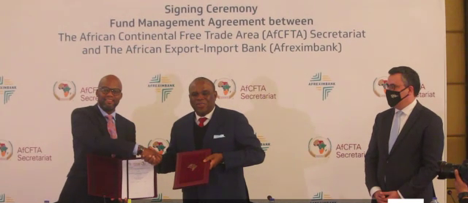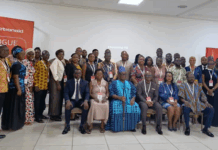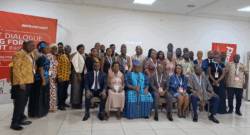The African Continental Free Trade Area (AfCFTA) Secretariat and the Africa Import and Export Bank (Afreximbank) have signed an agreement on management of the base fund for the AfCFTA Adjustment Fund in Cairo, Egypt.
The agreement was signed by Prof. Benedict Oraman, president and chairman of the board of Afreximbank, and Wamkele Mene, Secretary-General of the AfCFTA Secretariat.
The ACFTA Adjustment facility will have a member-state-driven process: having on board the council of ministers of the AfCFTA at the top of its structure, supported by a board of trustees and with the Secretariat as the implementing body leading the process.
The AfCFTA Secretariat says the fund will support African countries, especially their private sector, to actively participate in the new trading environment that has been established under the single continental market.
“We want to make a difference; we want to ensure that the AfCFTA benefits not just our big corporations but also the millions of small and medium enterprises and Africa’s private sector as well.
“The benefits are real and therefore the Secretariat is deeply committed and convinced that this partnership is what the continent requires if we are to fundamentally transform the African economy’s structure,” said Wamkele Mene, AfCFTA Secretary-General.
According to Mene, there can be no real transformation of the continent without trade finance.
“It’ll become just another agreement or diplomatic exercise with no direct benefit to Africans, and that’s why this partnership with Afreximbank is so critical,” he added.
The AfCFTA boss highlighted the fact there are still some African nations that do not have any form of export competitiveness, and could suffer if they were to reduce their tariffs to zero; hence the need for that long-term fiscal support.
The AfCFTA Adjustment Fund consists of a base fund, a general fund and a credit fund. The base fund is made of contributions from state parties granting technical assistance capital to advance tariff revenue losses as they are progressively eliminated. It will also support countries to implement various provisions of the AfCFTA agreement, its protocols and annexes.
The general fund will mobilise concessional funding while the credit fund will source commercial funding to support both the public and private sectors, enabling them to adjust and take advantage of opportunities created by the single continental market.
Prof. Benedict Oramah of Afreximbank, on his part, indicated that the fund is a necessary tool that will ensure no country becomes worse-off due to implementation of the AfCFTA.
“The AfCFTA-led integration will be meaningless unless it results in economic prosperity for the entire continent, and if it brings prosperity to some countries and businesses and penury and difficulty to others.”










